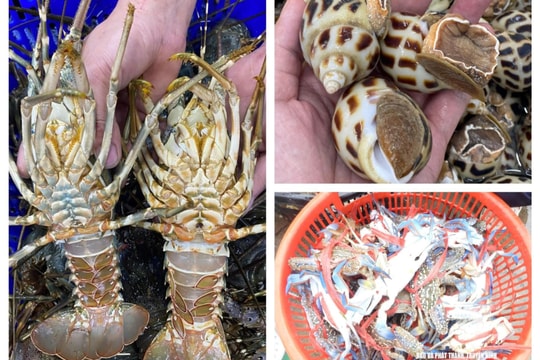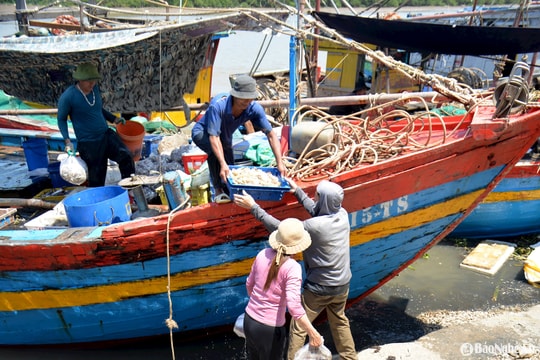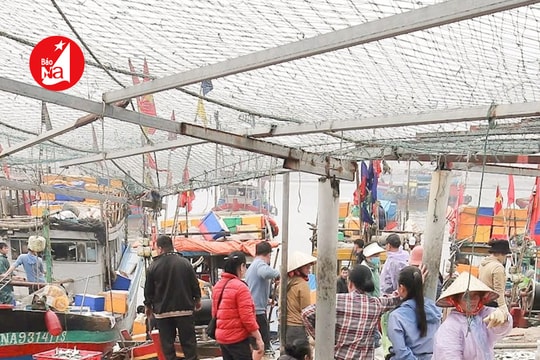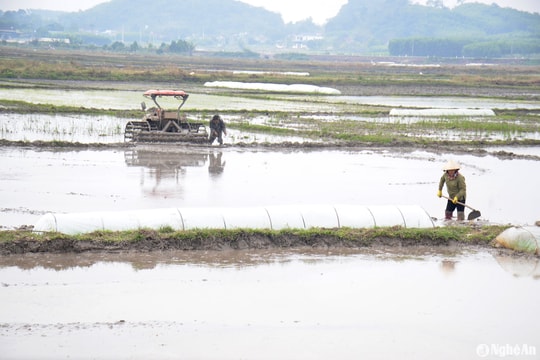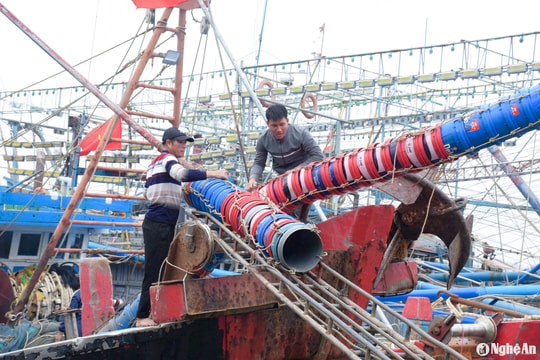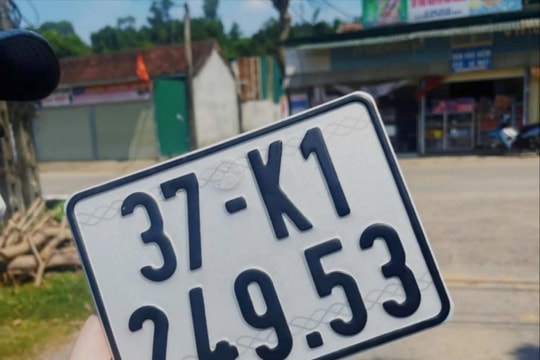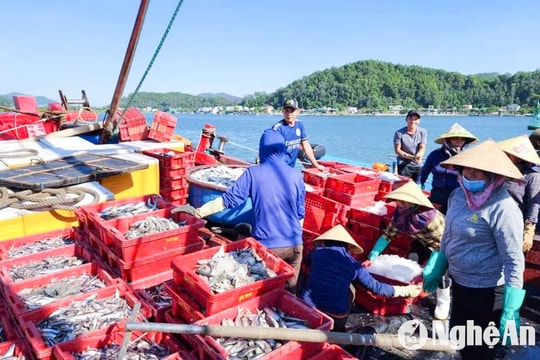Part 3: A sleepless night at sea...
» Nghe An fishermen go to sea despite China's unreasonable ban
» The first net catch on the Gulf of Tonkin voyage
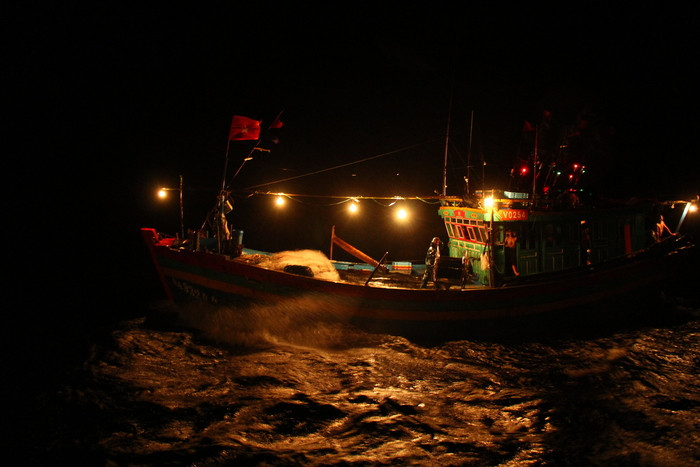 |
| Nghe An fishermen's fishing boats at night at sea. Photo: Tien Hung |
On the third day of fishing at sea, we were in the middle of Bach Long Vi Island of Vietnam and Hainan Island of China. Yesterday, after running from the “lair” to here, our boat immediately dropped the net. Not as bad as the first day, the second day had quite a lot of fish.
After untangling the nets until 11 p.m., the crew estimated they had caught nearly a ton of fish. “This is not much! Some days we get 3 tons!” - Lin Da told me. Normally, each offshore fishing trip of a fishing boat like Mr. Dien’s, they catch about 10 tons of fish; on average, they earn nearly 300 million VND for nearly half a month of work.
Hoang Duc Lin Da (18 years old), works as a chef on the Dien ship. Lin Da is one of the two youngest crew members but has been at sea for more than 10 years. After dropping out of school, Lin Da followed his father to sea. Da's first job was just helping wash dishes on the ship. "At that time, my family was very poor. We didn't even have rice to eat. I still remember, we had to temporarily build a house with 4 poles and then stretch out a tarpaulin to live in. I had to drop out of school because I didn't have money," Lin Da said. He added that, after many years of working hard at sea, with his mother staying at home to mend fishing nets, the family has built a spacious two-story house. Lin Da's income in the past few months has been quite high because the ship often catches a lot of fish. In the last two trips to sea, he received more than 20 million VND.
“I can read the words on the phone or on the computer, but I can’t read the words written by hand. I don’t know how to write on paper, and no one can read them,” Lin Da said with a smile. Lin Da is very slow with words, but when he is at sea, he is very agile and resourceful. There is nothing on the ship that Lin Da doesn’t know how to do. The other crew members often call him Chef Da. With this extra job, he gets an extra 0.3% for each trip. That means if the other crew members are given 10 million VND for a trip, he will receive 13 million.
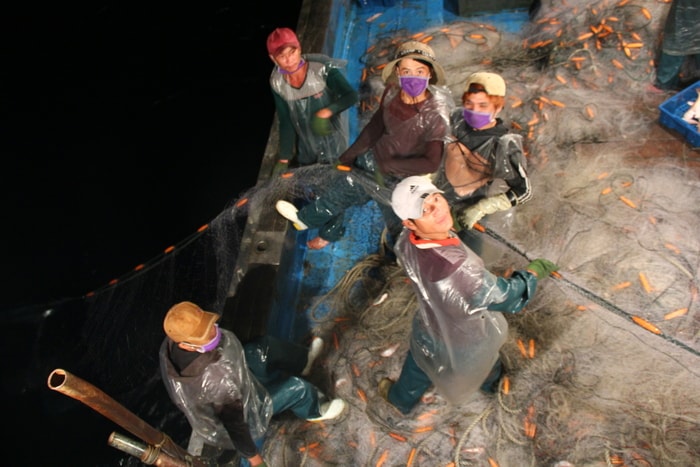 |
| When the net got tangled in the winch, the crew had to pull it out by hand. Photo: Tien Hung. |
After casting the net, the crew gathered around to eat, chatting endlessly. Suddenly, the wind blew strongly, dark clouds gathered. Rain poured down quickly. The sea was rough. Thunder and lightning boomed continuously. Our ship rocked continuously, as if it was about to capsize. In contrast to my anxiety, the crew members' faces remained calm.
Around noon, the rain finally stopped, the waves calmed down again. As usual, at 11 o'clock, Captain Dien asked the crew to prepare to pull the net. It seemed that his years of experience at sea had made him guess what was waiting for them in the nets below. The captain's face was unusually pensive. The first line of net was pulled up, and the crew's faces suddenly changed color. "Oh no! This time it will take until morning to untangle it," crew member Nguyen Phu sighed.
The rough seas caused the water below to flow strongly, causing the nets to get tangled in the winch. This time, the crew could not use a machine and had to pull the nets by hand. The five youngest stood at the side of the ship, straining to pull the heavy nets. The others stood behind, removing the fish, untying the winch from the nets, and neatly storing them in the hold. At 3 a.m. the next morning, the work was finally done. Only then did Lin Da rush to the back of the ship to cook. The meal had a full menu of dishes brought from the mainland, such as chicken and vegetables, but mainly seafood caught that day. “I’m so tired. Now I’ll eat whatever fish is the best,” Chef Da said with a smile.
On the ship, the crew eats two meals a day. Breakfast is also lunch after they finish fishing, usually at 9am. But dinner has no specific time. They eat whenever they finish fishing. Early is 8pm, late is 3am or 4am the next morning. Today, they have worked continuously for 16 hours. "The net is still in the sea, I don't feel safe letting the whole crew stop to eat. Besides, we have to finish fishing before 5am to continue fishing the next day," said crew member Nguyen Phu. When they are too hungry, the crew often rummage for dry food, biscuits or instant noodles to eat. But only one person per person, eating quickly so they can go back to work. They cannot rest many people at the same time because this stage is done in an assembly line...
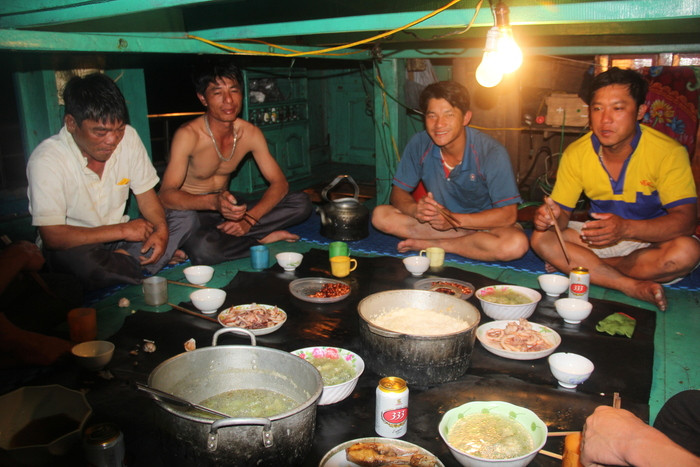 |
| Dinner at 3am. Photo: Tien Hung. |
I couldn’t sleep. Looking at the crew members lying around on the loft, my mind was filled with hopes for a smooth fishing day ahead. However, the rain poured down all day on the 4th day. The wind gusted to force 6, force 7. This time, we dropped our nets right on the oyster shells. The rough sea and strong currents caused the oyster shells that were lying on the seabed to drift away and get stuck in the fishermen’s nets. The crew members spent a lot of time removing each oyster and throwing them back into the sea.
“I can’t sleep again tonight,” Lin Da said dejectedly. It was still raining heavily, with waves about 3 meters high continuously hitting the ship’s side, foam flying everywhere. The rain splashed into the cabin. The ship was rocking, and the waves were hitting their faces, but the 10 crew members were still standing firmly on the deck, their hands quickly removing each section of the net. Unlike the previous fishing day, today, at 3 a.m. they still hadn’t finished removing the net. Looking around the pile of nets that had been pulled up, crew member Nguyen Phu estimated that there were still about 4 nautical miles left to be removed. “There’s no time. Let’s rest and eat. Let’s leave it there and continue tomorrow,” Captain Dien instructed. So they had to accept giving up a day of fishing to finish removing it. “In this profession, you have to time the net release and the net pull-up correctly. If you release it too late, there won’t be any fish because it depends on the tide. If it’s late, it’ll be a day late,” Dien explained.
Mr. Dien estimated that skipping a day without fishing like that would cost about 25 million VND. However, at this time, the crew members no longer seemed to think about that problem. They happily joked during their meals. “Even though we got caught in oysters, we still caught a lot of fish. Meals at 3am like this are normal. It’s hard work but we get paid,” Lin Da told me. After eating, the crew members spent about 4 hours untangling the remaining nets, then slept comfortably, waiting for the next day of fishing.
| Investing in offshore fishing vessels is the development goal in the marine sector of Nghe An province. Not only for the northern waters of the Gulf of Tonkin but also towards Hoang Sa and Truong Sa. If in 2014, Nghe An only had 1 vessel participating in exploiting the Hoang Sa waters, by 2016 there were more than 30 vessels. The number of fishing vessels participating in offshore fishing will increase in the following years. These vessels are not only a force to reduce the pressure on coastal fishing, increase production efficiency for fishermen, but also participate in protecting the sovereignty of the sea and islands of the Fatherland. |
(continued)
| RELATED NEWS |
|---|

